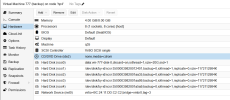Hi All,
I am running Backup Server inside of PVE VM. Yes, I know it is not the best practices, but I can't afford dedicate hardware for it. Backup data are placed to ZFS raid5 of 4 disks, the disks are bypassed to VM as whole units.
What I see is extrmally high iowait inside of VM at backup times and almost no iowait increase on the host.

Green line is VM, red one is the host, spikes in the host related to VM replication inside PVE cluster.
The Backup server VM config:

All this sounds quite strange for me. I did not found a way to allocate more IO to VM, especially for bypassed block devices.
Unfortunately, I can't bypass it as PCI because of HP Raid controller in direct mode used.
I am very appreciating for any suggestions on the case!
I am running Backup Server inside of PVE VM. Yes, I know it is not the best practices, but I can't afford dedicate hardware for it. Backup data are placed to ZFS raid5 of 4 disks, the disks are bypassed to VM as whole units.
What I see is extrmally high iowait inside of VM at backup times and almost no iowait increase on the host.

Green line is VM, red one is the host, spikes in the host related to VM replication inside PVE cluster.
The Backup server VM config:

All this sounds quite strange for me. I did not found a way to allocate more IO to VM, especially for bypassed block devices.
Unfortunately, I can't bypass it as PCI because of HP Raid controller in direct mode used.
I am very appreciating for any suggestions on the case!

